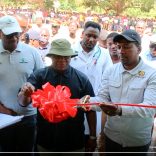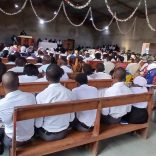Mozambique: Metata Health Centre reopens in Balama after major renovation supported by the Aga Khan ...
Mozambique: Those who dream of returning home find hope in international support

Photos: Luisa Nhantumbo / Lusa
Sawege Farque lost his mother fleeing attacks on her village a year ago, and today, with international support for Mozambique to curb terrorism in Cabo Delgado, the hope of visiting the deceased’s grave gains wings.
“I want to go back home to visit the place where I buried my mother,” Farque tells Lusa, a few metres from his makeshift thatch hut in a camp for the displaced he shares with around 200 other displaced families in Metuge, about 42 kilometres from the provincial capital, Pemba.
Farque’s mother died after tripping while fleeing an armed attack in Mucojo, Macomia district, in August of last year, and her son did not find her body to bury it until days later. He has been unable to visit the grave since then.
Today, the news that Mozambique has international support to fight terrorism gives back hope to the former farmer, who dreams of returning to Macomia to pay tribute to his mother.
“I’m going to visit the place where she is buried,” he repeats.
On the brink of absolute poverty and responsible for a family of six, Farque’s life at the camp for the displaced is all about watching time go by and waiting for the support of a non-governmental organisation or family of goodwill, which doesn’t always arrive.
“Our dream is to return to our areas of origin,” he says.
The desire to return home is not his alone. There are hundreds more people who have sought shelter in this district in recent years and who continue to dream of returning to their homeland, although they are aware that they have lost the little they had there.
Small farmer Abu Sefo, 52 years old, is also on this long list. He fled Mocímboa da Praia a year ago with his family, leaving behind everything he had built, but today hope returns with the announcement that the joint force of Mozambican and Rwandan troops has recovered the main town in that district, considered by many the insurgents’ base.
“I was glad to know [that the joint force controls Mocímboa da Praia] because I want to go back. Here [in the reception centre] I’m sleeping on the floor, and to eat is a big sacrifice,” says the former farmer who lived in Mangoma, 15 kilometres from the town of Mocímboa da Praia.
Like Sefo, Daúde Ossemane, 62, fled Mocímboa with his wife and eight children and, for almost a year, the family has shared the same room in a small hut and a tent donated by the International Organisation for Migration in Metuge.
“This is suffering. My wife and I sleep with the children. It’s difficult. I know that they [the insurgents] have already destroyed everything in my house, but I want to go back,” he said.
But Sefo and Ossemane’s dream is not as close as it appears. Despite government forces on August 8 taking the headquarters town in the district where the attacks began in October, 2017, authorities clarify that cleaning-up operations continue, and that, given the level of destruction left by the rebels, conditions for the populace to return do not prevail.
The town, 70 kilometres south of the natural gas exploration project led by Total, was invaded and occupied by rebels on March 23 last year, in an action later claimed by the ‘jihadist’ group Islamic State, and was, on June 27 and 28 of the same year, the scene of prolonged clashes between government forces and the insurgents, which led to the flight of a considerable part of the population.

In addition to Rwanda, Mozambique now has support from the Southern African Development Community (SADC) ‘Joint Standby Force’ approved on June 23 at an extraordinary summit in Maputo. Soldiers from some member countries are already on the ground.
The attacks which have terrorised Cabo Delgado province since 2017 have cost more than 3,100 lives, according to the ACLED conflict registration project, and displaced more than 817,000, according to Mozambican authorities.
















Leave a Reply
Be the First to Comment!
You must be logged in to post a comment.
You must be logged in to post a comment.